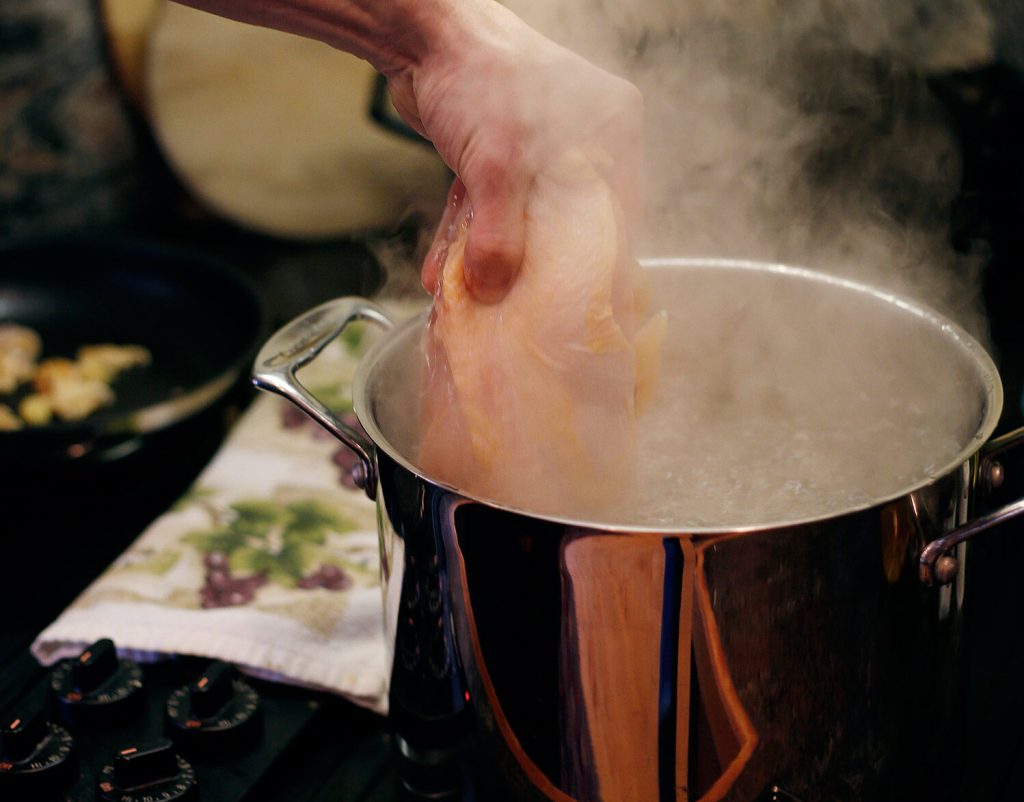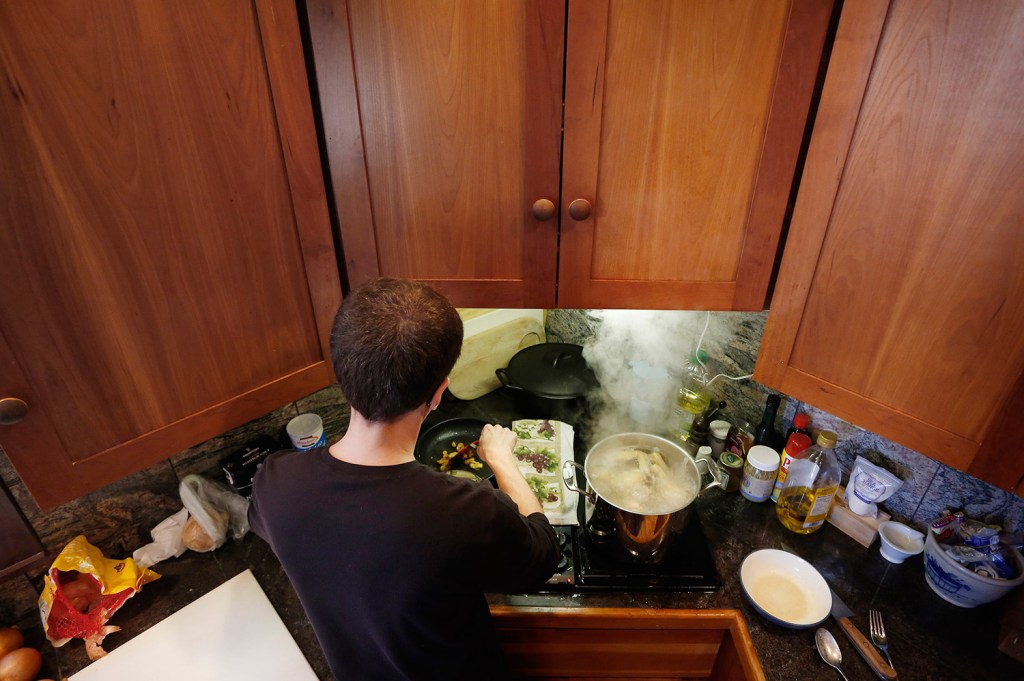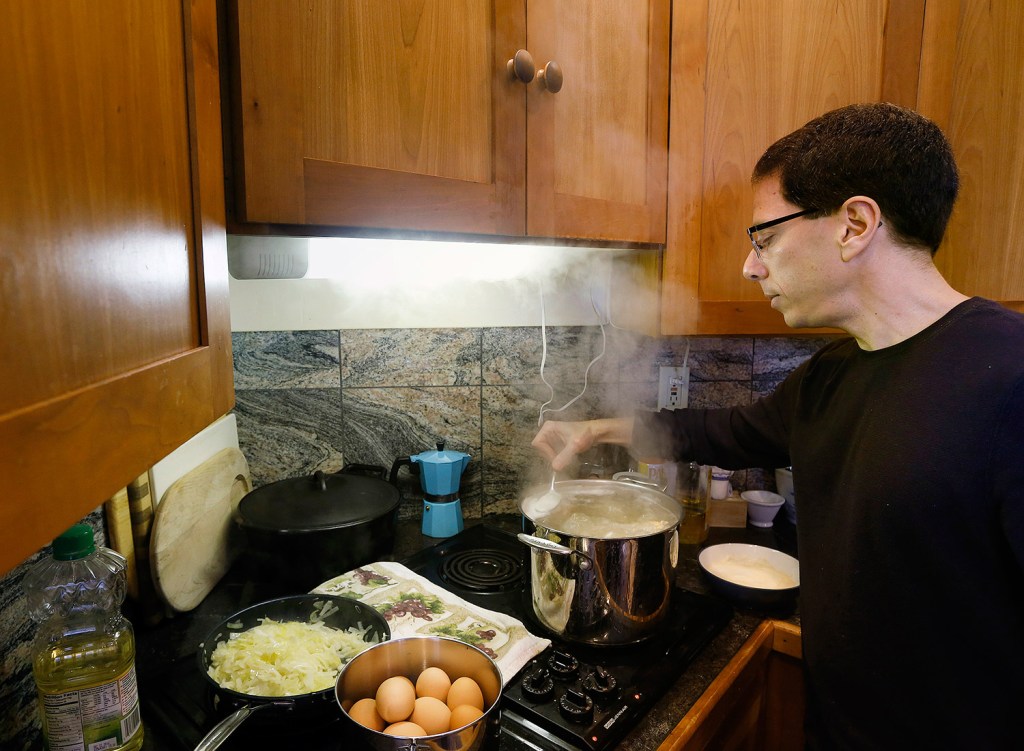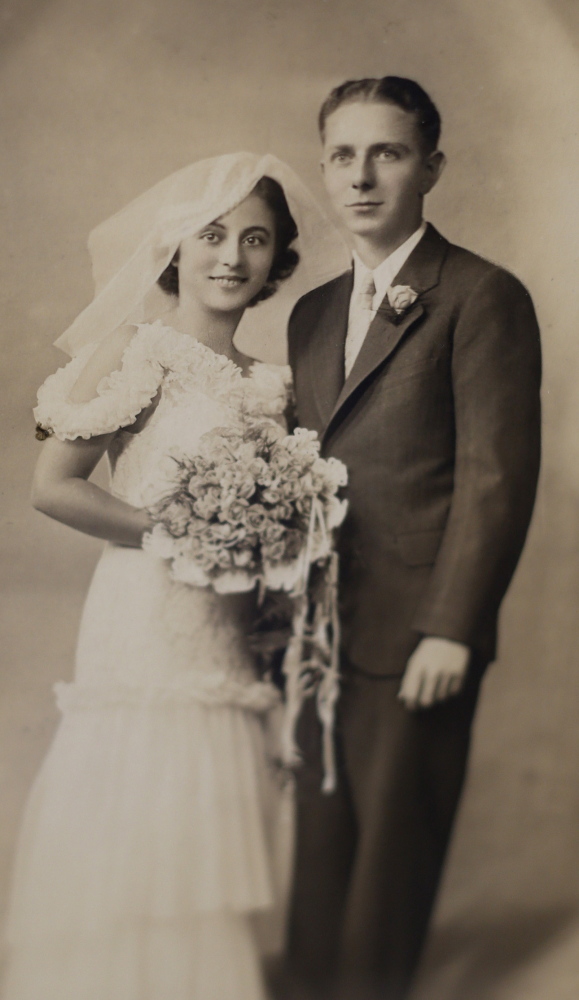As Dan Skwire, a 45-year-old actuary from Portland, crisps some chicken skin on the stovetop, the chicken that the trimmings came from simmers in a big pot, filling his West End home with the comforting smell of chicken soup-in-progress.
The chicken skin, cooked in the fat (schmaltz) trimmed from the bird, is called griven (also known as gribenes). It will serve as a handy snack for the cook during this hours-long process.
Skwire is showing a visitor his family chicken soup recipe, which he makes every Passover (Passover starts Friday at sunset) and one or two other nights a year. Occasionally, his wife, Denise, wanders in to see how things are coming along. And, oh yes, there’s one other person in the room: the spirit of his grandmother Ida Skwire, the woman who taught him how to make the soup, and whose voice he “hears” in his head occasionally, admonishing him to skim it.
Dan Skwire and his grandmother made chicken soup together many times when she was alive. (She died in 2009 at age 96.) She used to fly to Cleveland, where he and his sister grew up, to make it for their birthdays. Even when they weren’t together, Skwire said, “I would always give her a call when I was making it, whether or not I actually had a question. She was always giving me little pointers on trying to make it as clear as possible, which is not the easiest thing it the world. It mostly involves a lot of skimming.”
In the end, Skwire got a lot more from his grandmother than a great recipe for chicken soup. They were particularly close, enjoying a shared interest in music, and they talked often about family stories and their Jewish heritage. Thanks largely to her influence, Skwire, who was raised Unitarian, converted to Judaism himself in the late 1990s.
Ida Skwire’s parents came to this country in the early 20th century through Ellis Island. The family, Orthodox Jews, lived in a tenement building in New York’s Lower East Side, where Ida Skwire was born in 1913. They were very poor; her father peddled produce. When Skwire was a girl, her mother would send her to the corner store with a nickel for soup greens.
When Skwire grew up she married Raymond, and they lived together in Brooklyn, where she continued the family’s chicken soup tradition. After her husband died, she moved to Long Island, where her grandson Dan visited her from Ohio for a couple of weeks each summer.
In their roamings around New York, a frequent stop was Katz’s Delicatessen.
“She cared a lot about that place,” Skwire said. “It’s an old-time New York deli, and they’re famous for their salamis. Their motto during World War II was ‘Send a salami to your boy in the army.’ When I was in college she would send me salamis by mail order.”
Grandma Skwire didn’t believe in credit cards. So she would place her order with Katz’s using cash or check, and she’d include meticulously typewritten instructions about the quality of salami she wanted because, after all, it was going to her grandson.
When Grandma Skwire flew to Cleveland for her grandchildren’s birthdays, she’d disembark from the plane balancing a large shopping bag in each hand. One bag contained everything she needed to make the birthday boy or girl a pot of chicken soup – including, occasionally, the actual chickens. (Presumably the poultry in Cleveland didn’t meet Jewish grandmother standards.)
“Then the other bag would have a dozen bagels and lox and all these other deli treats,” Skwire said.
Grandma Skwire made adjustments to the chicken soup to accommodate her daughter-in-law, a Unitarian minister.
“When my grandmother would serve the soup, she traditionally would not serve the vegetables,” said Skwire, who chooses to serve the vegetables as a second course with the chicken. “She’d serve the soup and the chicken, but just throw out the vegetables that had been in it, and it horrified my mother, who loved vegetables, and it had these carrots and onions and things that had been slow simmered in chicken broth.”
Grandma Skwire was persuaded to let her daughter-in-law eat the vegetables, and from then on she always added extra.
Another adjustment involves a side dish. One of Grandma Skwire’s specialties was chopped liver – but her daughter-in-law hates liver. So she started leaving out the liver, which transformed it into a simple egg-and-onion salad made with chopped eggs and onions sautéed in chicken fat.
In the early 1980s, when Skwire turned 13 – the age at which he would have had a bar mitzvah had he been raised Jewish – his grandmother took him on a trip to Israel. By the time he got out of college, he was identifying himself more and more as a Jew. He started attending synagogue. By the late 1990s, he was ready to convert. His grandmother was “thrilled,” he said.
Skwire said his grandmother had served as a cultural influence on him, “but the religion spoke to me, as well. It has very universal messages. Most of the Jewish holidays are really just about freedom, Passover being a classic example – freedom from slavery in Egypt. It’s always a message that resonates at any period of history, with any culture. There’s an old joke about Jewish holidays, that every Jewish holiday can be summarized as ‘They tried to kill us. We won. Let’s eat.’ ”
Skwire doesn’t think his chicken soup has yet matched his grandmother’s, although he follows her instructions to a T, down to using dill in addition to the traditional carrots, onions and parsley (“it gives it a ton of flavor”) and using white – and only white – thread to tie the herbs into bundles.
“She thought that anything else would have some kind of dye in it that would make the soup less clear,” Skwire said. “She really cared about that.”
If there’s one thing Skwire is sure of, it’s that his grandma had exacting standards.
“She had a neighbor who claimed she also had a famous chicken soup recipe,” Skwire recalled, chuckling. “And they started comparing notes. And the other woman’s recipe at some point involved putting in a couple of bouillon cubes. My grandmother could hardly tell the story she would get so upset.”
Send questions/comments to the editors.











Success. Please wait for the page to reload. If the page does not reload within 5 seconds, please refresh the page.
Enter your email and password to access comments.
Hi, to comment on stories you must . This profile is in addition to your subscription and website login.
Already have a commenting profile? .
Invalid username/password.
Please check your email to confirm and complete your registration.
Only subscribers are eligible to post comments. Please subscribe or login first for digital access. Here’s why.
Use the form below to reset your password. When you've submitted your account email, we will send an email with a reset code.